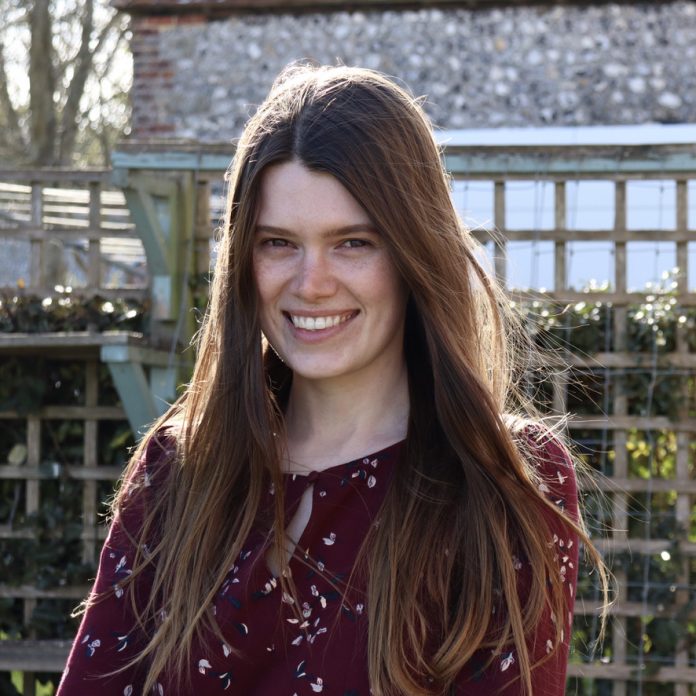From losing her job to launching a sustainable start-up, Rhianne Jacklin bounced back from the pandemic, with an eco-conscious, sustainable homeware business.
It was while baking at home during the first lockdown that Rhianne had her flash of entrepreneurial inspiration. She wanted to make something that kept her loaves fresh for longer in an eco-friendly way.
And so The Forager’s Cottage was born, along with her first product, The Wheat Fields Bread Bag.
But let’s go back to the beginning.
Being made redundant
Rhianne’s step into the entrepreneurial world wasn’t exactly planned.
“I was working as an office manager for a small aviation business,” Rhianne said. “They furloughed everyone at the start of lockdown but unfortunately couldn’t take me back on later in the year.
“It was initially quite devastating to lose my job, especially in the middle of a pandemic, as you might expect! But often big turning points in life come along when you least expect them and I resolved to try and make something good out of a bad situation.”
Read more: How I started my own floristry business after redundancy
Taking an opportunity
So Rhianne created her cotton bread bag – wanting to avoid throw-away single-use plastic.
Having taught herself enough web design to get an e-commerce store launched and online,
she invested her last furlough payment into 100 bread bags. Then it was time to tell the world.

“As any entrepreneur will tell you, and yes it’s a cliché, you really do need to have a lot of ‘irons in the fire’ – especially when you’re just getting started,” Rhianne said. “So when I had my first product ready, I was contacting everyone I could think of who might be able to help me get noticed by potential customers.
“I’m an avid BBC Radio 6 Music listener, and Lauren Laverne’s breakfast show has a segment where they help promote small businesses. So I wrote to them with my story and almost forgot about it, to be honest. I just carried on writing to other papers, magazines, blogs etc.
“Then one morning later that week I heard her talking about my business – The Forager’s Cottage – which was really exciting. And then I started getting notifications on my phone. One after another. And another. It was crazy! By lunchtime, I’d had something like 100 orders come through on my website.
“That afternoon I had a literal wheelbarrow full of boxes packaged up and was on my way to the post office. That’s the moment I knew I might actually have a business, and was on my way to becoming an ‘entrepreneur’.”

Building an eco-friendly homeware brand
After the runaway success of her bread bags, Rhianne realised she was on to something and that there really was a gap in the market for sustainable homewares. The cheap, mass-produced products we are all addicted to simply aren’t built to last.
“The Forager’s Cottage is a forward-looking, digital business, but one that’s firmly grounded in the traditional values I think we’ve all lost touch with a bit in recent times,” said Rhianne.
“We develop products of high quality, that are built to last.”
Next, she set her sights on reusable bags for fruit and vegetables, and then handcrafted wooden serving boards.
“I want to reinvigorate ‘traditional’ values and sell high quality, built-to-last pieces,” Rhianne shared. “Whilst plastic-free everyday items are always going to be important, I also want to make beautiful and useful products that you can gift to your grandchildren – real family heirlooms to be treasured for a long time.”
But it’s not all been plain sailing
“When you go from being an employee to being in charge of everything, there’s an awful lot to learn, and fast,” said Rhianne. “That can be overwhelming and empowering in equal measure.”
“I had to do my own accounts, build my own website and do all the sales and marketing – alongside trying to be a great saleswoman, photographer and copywriter. That’s a lot, but it’s also really empowering when you realise you can do all of these things. It’s just about putting in the effort and the hours.
“But the biggest challenge I think is financial. I funded The Forager’s Cottage with my last furlough payment. That’s really a tiny amount of start-up capital to get a business started with – and so my focus this year will be in getting some seed investors on board so we can turbocharge the growth of the business.”
What’s next for The Forager’s Cottage?
“Right now I’m laser-focused on building The Forager’s Cottage into the UK’s leading sustainable homewares brand,” said Rhianne. “In the future? I’ve ambitions for international expansion, taking the same model of sourcing locally to foreign markets. We’ve actually made a start on this already!”

On what it’s like to take the leap
“I’ve always wanted to start my own business but taking that leap is scary,” Rhianne shared. “My advice to anyone else is that it will probably never seem like the ‘right time’ – at some point, you just have to get started.
“If there’s something you really care about and that drives you, it’s a big help. For me, it’s sustainability. I’d grown tired of seeing other businesses be so wasteful and seeing so few women in charge and decided the best way to change that was to found my own start-up.”
To find out more about The Forager’s Cottage, visit: www.theforagerscottage.com
